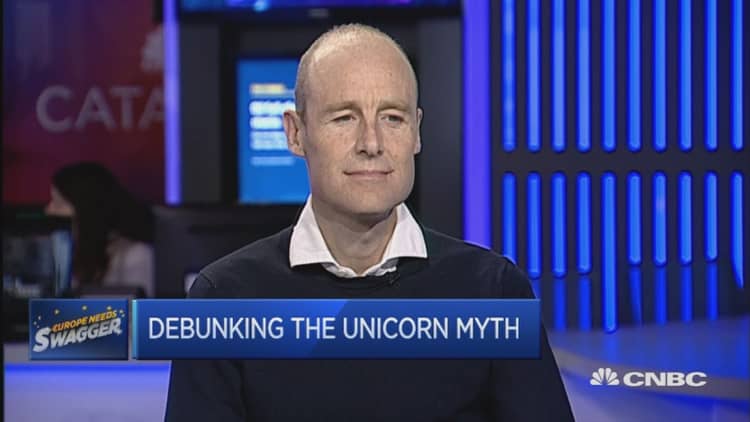Investing in "unicorns" – or start-ups valued over $1 billion – has become a "substantially more dangerous and complicated practice", top venture capitalist Bill Gurley warned on Thursday, highlighting emerging trends including the rise of "sharks" or opportunistic investors offering "dirty" conditions to entrepreneurs.
Writing a in a blog post published on Thursday, Gurley – who sits on the board of companies like Uber – discussed the current start-up environment and trends that are concerning him.
"The pressures of lofty paper valuations, massive burn rates (and the subsequent need for more cash), and unprecedented low levels of IPOs and M&A, have created a complex and unique circumstance which many Unicorn CEOs and investors are ill-prepared to navigate," Gurley said.
‘Dry bubble’
The investor's comments come amid a slowdown in venture capital investment and as the public markets have seen hardly any activity in terms of private technology companies listing.
In the first quarter of 2016, global VC funding hit $25.5 billion, a slight dip from the $27.7 billion recorded in the fourth quarter of 2015 and a significant decline from the $39 billion invested in the third quarter, according to data from KPMG. Still 2015 was a record year for VC investments with $129.5 billion invested, but in the last six months, the sentiment has begun to change.
"In 1999, record valuations coexisted with record IPOs and shareholder liquidity. 2015 was the exact opposite. Record private Unicorn valuations were offset by increasingly fewer and fewer IPOs. If 1999 was a wet (read liquid) bubble, 2015 was a particularly dry one. Everyone was successful on paper, but in terms of real cash-on-cash returns, there was little to show," Gurley explained.
"Late 2015 also brought the arrival of "mutual fund markdowns." Many Unicorns had taken private fundraising dollars from mutual funds. These mutual funds "mark-to-market" every day, and fund managers are compensated periodically on this performance. As a result, most firms have independent internal groups that periodically analyze valuations. With the public markets down, these groups began writing down Unicorn valuations."
The year was peppered with examples such as Fidelity marking down its holding in Hootsuite, Dropbox and Snapchat. Gurley also pointed towards companies such as Homejoy shutting down and the likes of Twitter and Jawbone laying off staff.
‘Sharks’ swim for start-ups
One result of the new environment could be some players attempting a "brisk and desperate grab at immediate liquidity".
But another trend that Gurley sounded the alarm on was the rise of "sharks" – "opportunistic investors" who can "craft investments that can exploit the situation".
"They lie in wait of these exact situations, and salivate at the opportunity to exercise their advantage," Gurley warned.
He explained that they would offer companies "dirty" term sheets or investment conditions for them to achieve the valuation required. Examples of dubious terms could include guaranteed IPO terms or superior preferences or liquidity rights. These terms will allow the shark to get a good return even if the exit of a start-up is far below the valuation of the company.
Gurley said these dirty term sheets can "explode" at some point in the future and the complexity of the conditions could "render future financings all but impossible.

Start-ups are also seeing this happening. On Wednesday, the founder of Dutch payments company Adyen which is valued at $2.3 billion, said that the Unicorn status is not necessarily something to strive for.
"There's a certain drive for entrepreneurs to be in that Unicorn list, because that logically gives you a lot of exposure. So what you see is sometimes investors get very good conditions so that the entrepreneur gets their organization in the Unicorn list. And those conditions later on their life, could turn out to be very difficult," Pieter van der Does, CEO of Adyen, told CNBC in a TV interview.
Take a down round and IPO
So what's Gurley's advice?
Take a funding round at a lower valuation.
"Terms are the true Godzilla that should scare you to death. A down round is nothing. Get over it and move on," the VC said.
He also said that start-ups should focus on profitability to eliminate the need for a funding round. Often the mentality is to scale as quickly as possible, often requiring large chunks of money.
And finally, he adds that staying private for longer is not the right way forward and urges companies to go public in order to ensure "long-term value" of a founder and their employees' shares.
"The healthiest thing that could possibly happen is a dramatic increase in the real cost of capital and a return to an appreciation for sound business execution," Gurley concluded.


